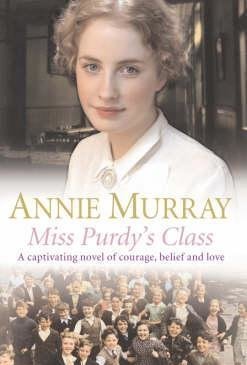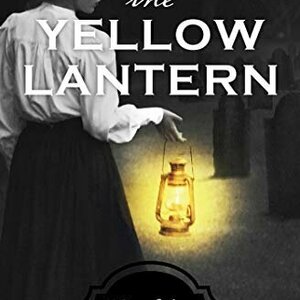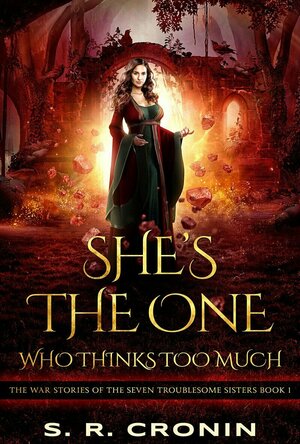Search
Night Reader Reviews (683 KP) rated Vanished in Books
Mar 18, 2020
Honest Review for Free Copy of Book
In Vanished by Gillian Alice Lock time travel is not a scientific discovery but a natural phenomenon. This book also falls in a gray area between science fiction, historical fiction, and romance.
Andrea lives with her little dog, Muff, out in the country. She tries to live a structured life but since she works from home she finds herself giving in to cravings more often. Luckily Muff is extremely high energy for a little dog and requires Andrea to take her for long walks. One day Andrea makes plans with the neighbor guy for a date after Muff’s walk. The neighbor waits for her but she doesn't show up, for years.
During their walk Andrea and Muff finds themselves pulled into a dense yellow mist and when it dissipates things have changed. The area they are in looks familiar yet it is not the home they are used to, but instead, it looks more like pictures from a history book. Andrea draws a lot of attention to herself from the way she talks and dresses and soon finds herself with Father Jones. Through the Father, Andrea learns of Robert who also seems to have come from the future. Andrea manages to secure work along with room and board for herself and Robert at the home of William Farthing, a Lord. Sadly Andrea knows of the fate that is going to befall William and wars with herself about intervening. She also must come up with a decision if she wishes to return to her old life in the 21st century or try to keep her new one int the 17th.
I enjoyed how both positive and negative aspects of the 17th century are addressed. The dirty and poor living conditions are clearly depicted, as are the differences in food compared to what we are used to today. The lifestyle of those in the 17th century is very different from modern times but slower and calmer as well. There was inconsistency with the names of the characters in a few places. At times it was as if the reader is expected to recognize the name of a character that is only mentioned once. I can only guess that this is in error. The back of the book also says that it takes place in 2015 but in the actual story it is (to start out with) 2019. Without going into a lot of details as to why the wedding is also in the wrong year.
There is nothing in this book the I noticed that would make it inappropriate in any way. The topic and writing style might make it quite a bit boring for even middle school-aged readers. Those who like historical fiction and romance will probably enjoy this book. I rate this book 2 out of 4. Besides the inconsistencies and other issues, I mentioned earlier the book also had multiple typos and grammar errors. While I myself am not good in that area of writing the errors in this book were glaringly obvious even to me. The book needs to be closely edited and this seriously lowered the score.
https://www.facebook.com/nightreaderreviews/
https://smashbomb.com/nightreader
https://nightreaderreviews.blogspot.com/
Andrea lives with her little dog, Muff, out in the country. She tries to live a structured life but since she works from home she finds herself giving in to cravings more often. Luckily Muff is extremely high energy for a little dog and requires Andrea to take her for long walks. One day Andrea makes plans with the neighbor guy for a date after Muff’s walk. The neighbor waits for her but she doesn't show up, for years.
During their walk Andrea and Muff finds themselves pulled into a dense yellow mist and when it dissipates things have changed. The area they are in looks familiar yet it is not the home they are used to, but instead, it looks more like pictures from a history book. Andrea draws a lot of attention to herself from the way she talks and dresses and soon finds herself with Father Jones. Through the Father, Andrea learns of Robert who also seems to have come from the future. Andrea manages to secure work along with room and board for herself and Robert at the home of William Farthing, a Lord. Sadly Andrea knows of the fate that is going to befall William and wars with herself about intervening. She also must come up with a decision if she wishes to return to her old life in the 21st century or try to keep her new one int the 17th.
I enjoyed how both positive and negative aspects of the 17th century are addressed. The dirty and poor living conditions are clearly depicted, as are the differences in food compared to what we are used to today. The lifestyle of those in the 17th century is very different from modern times but slower and calmer as well. There was inconsistency with the names of the characters in a few places. At times it was as if the reader is expected to recognize the name of a character that is only mentioned once. I can only guess that this is in error. The back of the book also says that it takes place in 2015 but in the actual story it is (to start out with) 2019. Without going into a lot of details as to why the wedding is also in the wrong year.
There is nothing in this book the I noticed that would make it inappropriate in any way. The topic and writing style might make it quite a bit boring for even middle school-aged readers. Those who like historical fiction and romance will probably enjoy this book. I rate this book 2 out of 4. Besides the inconsistencies and other issues, I mentioned earlier the book also had multiple typos and grammar errors. While I myself am not good in that area of writing the errors in this book were glaringly obvious even to me. The book needs to be closely edited and this seriously lowered the score.
https://www.facebook.com/nightreaderreviews/
https://smashbomb.com/nightreader
https://nightreaderreviews.blogspot.com/
Merissa (13749 KP) rated Daughter of the King (The Derbfine Series #3) in Books
May 18, 2018
Daughter of the king (The Derbfine Series #3) by Ashley York
Daughter of the King is the third book in The Derbfine Series, but could be read as a standalone as most of the characters are not major ones in the first two books. Brighit and Darragh have been promised to each other, almost from birth. And whilst there is comfort in the familiarity, there is also worry for Brighit as she fears Darragh will want her to change, to become the 'perfect little wifey'. Darragh is aware of Brighit's behaviour and loves her spirit. The only way for these two to work together is to trust each other, and that doesn't appear to be happening any time soon.
Once again, this book will draw you in. Not so much for the mystery, as that is quite straightforward, but for the complications and restrictions upon others in that time. Brighit and Darragh have to talk to each other about what happened, truthfully, for any headway to be made. I loved how Darragh worked things to allow Brighit more freedom, and how she realised Darragh wasn't how she had pictured him.
I'm putting this one as my favourite out of the three, simply because of how well written Brighit and Darragh were. With no editing or grammatical errors, this book was a delight to read, and Ashley York is a fantastic historical romance writer that I have no hesitation in recommending.
* A copy of this book was provided to me with no requirements for a review. I voluntarily read this book, and my comments here are my honest opinion. *
Merissa
Archaeolibrarian - I Dig Good Books!
Once again, this book will draw you in. Not so much for the mystery, as that is quite straightforward, but for the complications and restrictions upon others in that time. Brighit and Darragh have to talk to each other about what happened, truthfully, for any headway to be made. I loved how Darragh worked things to allow Brighit more freedom, and how she realised Darragh wasn't how she had pictured him.
I'm putting this one as my favourite out of the three, simply because of how well written Brighit and Darragh were. With no editing or grammatical errors, this book was a delight to read, and Ashley York is a fantastic historical romance writer that I have no hesitation in recommending.
* A copy of this book was provided to me with no requirements for a review. I voluntarily read this book, and my comments here are my honest opinion. *
Merissa
Archaeolibrarian - I Dig Good Books!
Molly J (Cover To Cover Cafe) (106 KP) rated A Distant Melody (Wings of Glory, #1) in Books
Feb 25, 2019
Sarah Sundin has a new fan---me!!! I absolutely adored this book. It was humorous, romantic, sad, and filled with God through out the whole story. It even has a bit of a suspenseful twist to it, making this a book that immediately pulled me in.
I did not want to put this book done for anything! I wanted to turn page after page until I got the very last one to find out what happened to Allie, Baxter and the lovable Walt Novak! Although, I must say, I was not fond of Baxter. He wasn't charming at all! But Allie and Walt and their friends, they all captured my heart, and helped to over look the not so charming Baxter! I really loved the WWII era that Sundin used to create this story. I love WWII movies, so I knew this book wouldn't disappoint. I loved how Sundin was very detailed with the descriptions in this book.
Along with the wonderful characters that I mentioned above, Sarah Sundin also adds a wonderful, strong message of being honest. She shows that honesty is the most important factor in a friendship, or a romance for that matter! Between that message and God, this was a beautifully written, 5 star historical novel that will be permenantly on my shelf as the start of a great series collection! It has something for everyone, so grab a copy today, sit back and get ready for an adverturous flight back in time--you'll be glad you did! I can't wait for Wings of Glory #2--A Memory Between Us, due out September 2010!
I did not want to put this book done for anything! I wanted to turn page after page until I got the very last one to find out what happened to Allie, Baxter and the lovable Walt Novak! Although, I must say, I was not fond of Baxter. He wasn't charming at all! But Allie and Walt and their friends, they all captured my heart, and helped to over look the not so charming Baxter! I really loved the WWII era that Sundin used to create this story. I love WWII movies, so I knew this book wouldn't disappoint. I loved how Sundin was very detailed with the descriptions in this book.
Along with the wonderful characters that I mentioned above, Sarah Sundin also adds a wonderful, strong message of being honest. She shows that honesty is the most important factor in a friendship, or a romance for that matter! Between that message and God, this was a beautifully written, 5 star historical novel that will be permenantly on my shelf as the start of a great series collection! It has something for everyone, so grab a copy today, sit back and get ready for an adverturous flight back in time--you'll be glad you did! I can't wait for Wings of Glory #2--A Memory Between Us, due out September 2010!
Elli H Burton (1288 KP) rated Miss Purdys Class in Books
Jun 16, 2019 (Updated Jun 16, 2019)
Political themes meh.
Another Historical Romance which is my all time favourite thing to read. This is no exception and it ticks every box. A lovely read, gripping story and great writing.
A few downsides is that there is a relationship between Miss. Purdy and a student that seems to be more seasoned that explained in the book. This may be due to the fact that not until much later does the writing become Students point of view and therefore you don't actually know what is felt by them as the story progresses in the beginning. If and when you read it - i hope you see what I mean.
The love story isn't your typical one which is refreshing, I do always love a bit of change and this one is definitely one, it's absolutely heartbreaking though which in a critic point of view, is very well written and a good plotline.
The story has some real life issues from around that time included which was very political. As I am not politically inclined and I do most of my reading before bed, it was rather hard to keep interested when the characters went on page long rants about it. (Perhaps trying to read those parts during the day will help my poor mind keep up!!) The politics slowly takes over, but is quite essential to the story though unfortunately again for me, i found it hard to keep up.
All in all I'd say it is worth a read, although not my favourite Annie Murray book but I did thoroughly enjoy it.
A few downsides is that there is a relationship between Miss. Purdy and a student that seems to be more seasoned that explained in the book. This may be due to the fact that not until much later does the writing become Students point of view and therefore you don't actually know what is felt by them as the story progresses in the beginning. If and when you read it - i hope you see what I mean.
The love story isn't your typical one which is refreshing, I do always love a bit of change and this one is definitely one, it's absolutely heartbreaking though which in a critic point of view, is very well written and a good plotline.
The story has some real life issues from around that time included which was very political. As I am not politically inclined and I do most of my reading before bed, it was rather hard to keep interested when the characters went on page long rants about it. (Perhaps trying to read those parts during the day will help my poor mind keep up!!) The politics slowly takes over, but is quite essential to the story though unfortunately again for me, i found it hard to keep up.
All in all I'd say it is worth a read, although not my favourite Annie Murray book but I did thoroughly enjoy it.
Awix (3310 KP) rated Victor Frankenstein (2015) in Movies
Feb 25, 2018 (Updated Feb 25, 2018)
I, Igor
If you're one of those people who thinks that the story of Frankenstein pays far too much attention to him actually making the monster, and not enough to the details and ups-and-downs of his relationship with Igor the hunchback, then this is the film for you (although if that's your attitude, you really don't deserve Frankenstein movies at all). Deformed circus clown becomes brilliant self-taught surgeon and anatomist, is rescued by unconventional medical student, gets put to work stitching.
James McAvoy could have been a great Frankenstein, but not with a script like this one - narration keeps banging on about how familiar we all are with this story, before going off into new and wildly eccentric territory - Igor has a romance with a trapeze artist, there are problems with steampunk zombie chimps, etc. Actual creation of famous monster only happens in last ten minutes. Film has zero feeling for historical setting (a version of Victorian London where nobody bats an eyelid if your name is Igor or Frankenstein).
All the major themes of Shelley's story are basically sidelined in favour of overwrought emotional drama. Best thing in it is possibly Andrew Scott as a detective looking to bust Dr F for interfering with zoo animals; his scenes with McAvoy are actually pretty interesting. The kind of film that seems to be afraid the audience will get bored and wander away if there isn't an outbreak of slow-mo or CGI or whatever every five minutes. How does Max Landis manage to keep selling scripts like this one? Moderately good-looking but a massive waste of potential.
James McAvoy could have been a great Frankenstein, but not with a script like this one - narration keeps banging on about how familiar we all are with this story, before going off into new and wildly eccentric territory - Igor has a romance with a trapeze artist, there are problems with steampunk zombie chimps, etc. Actual creation of famous monster only happens in last ten minutes. Film has zero feeling for historical setting (a version of Victorian London where nobody bats an eyelid if your name is Igor or Frankenstein).
All the major themes of Shelley's story are basically sidelined in favour of overwrought emotional drama. Best thing in it is possibly Andrew Scott as a detective looking to bust Dr F for interfering with zoo animals; his scenes with McAvoy are actually pretty interesting. The kind of film that seems to be afraid the audience will get bored and wander away if there isn't an outbreak of slow-mo or CGI or whatever every five minutes. How does Max Landis manage to keep selling scripts like this one? Moderately good-looking but a massive waste of potential.
MaryAnn (14 KP) rated The Yellow Lantern in Books
Nov 4, 2019
osephine Is Forced to Spy for Grave Robbers
Step into True Colorsa new series of Historical Stories of Romance and American Crime
In Massachusetts in 1824, Josephine Clayton awakes on the table of the doctor shes assisted all these months. She was presumed dead by all and has become the doctors next corpse for his medical research. Frightened, the doctor tries to kill her, but Josephine begs to be spared. A deal is struckJosie will leave her village and work at a distant cotton mill. All the while, shell await her true missionposing as a mourner to help his body snatcher procure her replacement. At the mill though, Josie is praised for her medical remedies among the mill girls, gaining attention from the handsome factory manager Braham Taylor. Yet, when Brahams own loved one becomes the prey for the next grave robbing, Josie must make a choice that could put her dark past behind her or steal away the promise of any future at all. What price will Josie pay for love when her secrets begin to unravel
My Thoughts: This is a very unique mystery that will captivate readers from the beginning. A fictional novel based on true facts, this story gives the reader an insight to the horrific things that happened at the turn of the century.
This story will certainly keep the readers' attention. The author has created very believable characters. The readers will either like them or hate them.
This is a wonderful story for those who like a good mystery. This one has many twists in the plot to keep the readers on their toes.
Step into True Colorsa new series of Historical Stories of Romance and American Crime
In Massachusetts in 1824, Josephine Clayton awakes on the table of the doctor shes assisted all these months. She was presumed dead by all and has become the doctors next corpse for his medical research. Frightened, the doctor tries to kill her, but Josephine begs to be spared. A deal is struckJosie will leave her village and work at a distant cotton mill. All the while, shell await her true missionposing as a mourner to help his body snatcher procure her replacement. At the mill though, Josie is praised for her medical remedies among the mill girls, gaining attention from the handsome factory manager Braham Taylor. Yet, when Brahams own loved one becomes the prey for the next grave robbing, Josie must make a choice that could put her dark past behind her or steal away the promise of any future at all. What price will Josie pay for love when her secrets begin to unravel
My Thoughts: This is a very unique mystery that will captivate readers from the beginning. A fictional novel based on true facts, this story gives the reader an insight to the horrific things that happened at the turn of the century.
This story will certainly keep the readers' attention. The author has created very believable characters. The readers will either like them or hate them.
This is a wonderful story for those who like a good mystery. This one has many twists in the plot to keep the readers on their toes.
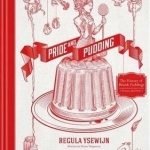
Pride and Pudding: The History of British Puddings, Savoury and Sweet
Book
Let Regula Ysewijn's Pride and Pudding take you to the heart of Britishness in this beautiful...
AO
Archives of American Time: Literature and Modernity in the Nineteenth Century
Book
American historians have typically argued that a shared experience of time worked to bind the...
She's the One Who Thinks Too Much is the first book in the War Stories of the Seven Troublesome Sisters series and we are introduced to a family of nine - two parents and seven sisters (obviously).
Ryalgar is the eldest of the seven and has helped her father on their farm until she becomes a Prince's 'girlfriend' and later mistress. The situation is so that he has to get married for political reasons and both him and his wife-to-be keep their current partners too. Of course, this will change but this is how it is for now. Add into that the threat of a Mongol invasion and you get an intricately woven story that gives great descriptions of both the time and (imaginary) place with the plans and defences they have to work with.
This fantasy is about the sisters and the situations they find themselves in. The romance takes a definite second place. The world-building is excellent, providing a clear insight into how the characters fit into the world. Each sister is brought into the story carefully and methodically whilst still leaving plenty to come in their own books.
The ending did feel quite abrupt even though I knew this would be an ongoing story. I look forward to it continuing in Coral's book and have no hesitation in recommending this for all who enjoy a historical fantasy.
* A copy of this book was provided to me with no requirements for a review. I voluntarily read this book, and the comments here are my honest opinion. *
Merissa
Archaeolibrarian - I Dig Good Books!
Ryalgar is the eldest of the seven and has helped her father on their farm until she becomes a Prince's 'girlfriend' and later mistress. The situation is so that he has to get married for political reasons and both him and his wife-to-be keep their current partners too. Of course, this will change but this is how it is for now. Add into that the threat of a Mongol invasion and you get an intricately woven story that gives great descriptions of both the time and (imaginary) place with the plans and defences they have to work with.
This fantasy is about the sisters and the situations they find themselves in. The romance takes a definite second place. The world-building is excellent, providing a clear insight into how the characters fit into the world. Each sister is brought into the story carefully and methodically whilst still leaving plenty to come in their own books.
The ending did feel quite abrupt even though I knew this would be an ongoing story. I look forward to it continuing in Coral's book and have no hesitation in recommending this for all who enjoy a historical fantasy.
* A copy of this book was provided to me with no requirements for a review. I voluntarily read this book, and the comments here are my honest opinion. *
Merissa
Archaeolibrarian - I Dig Good Books!
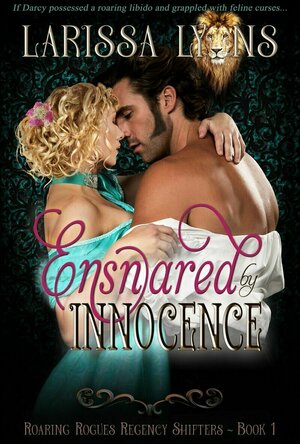
Ensnared by Innocence (Roaring Rogues #1)
Book
Oh, the angst! Changing into a lion isn’t all fur and games. Lord Blakely doesn’t have time...
Historical Paranormal Romance Shifters Regency



